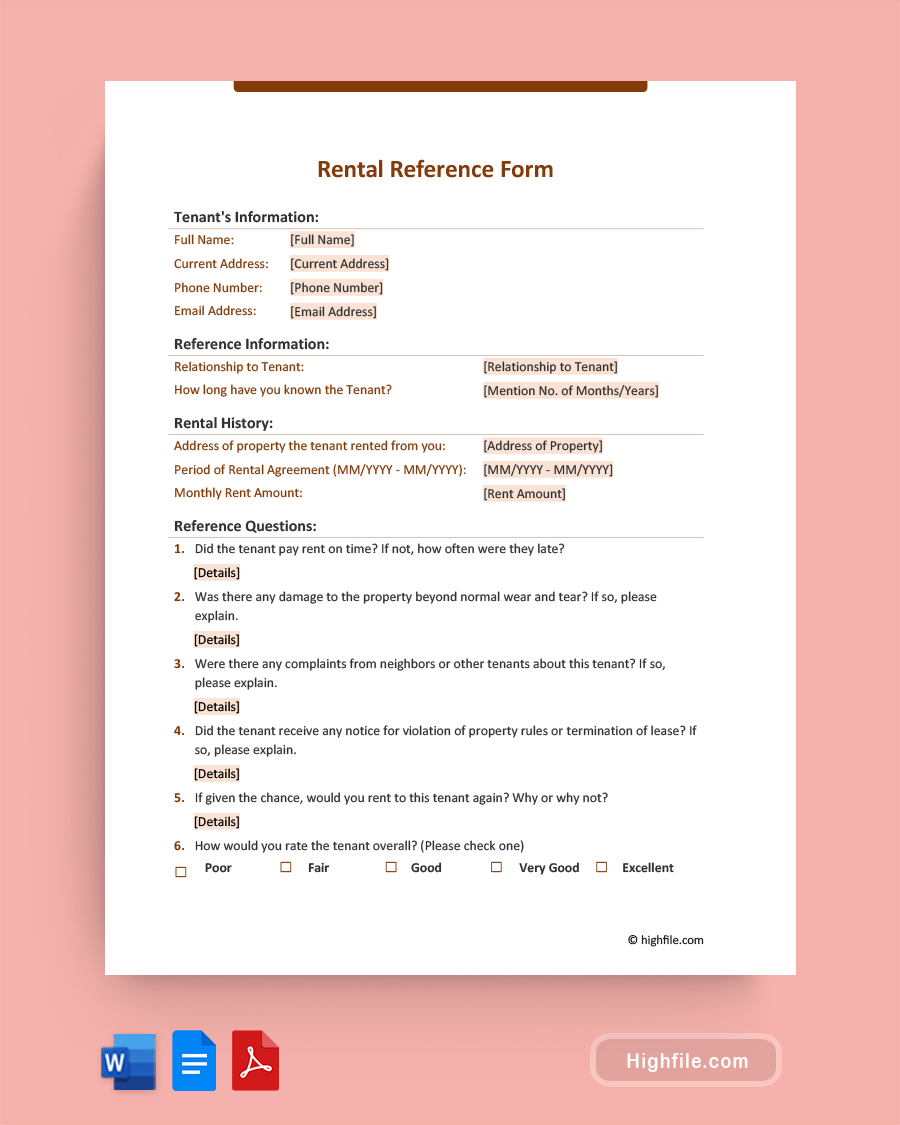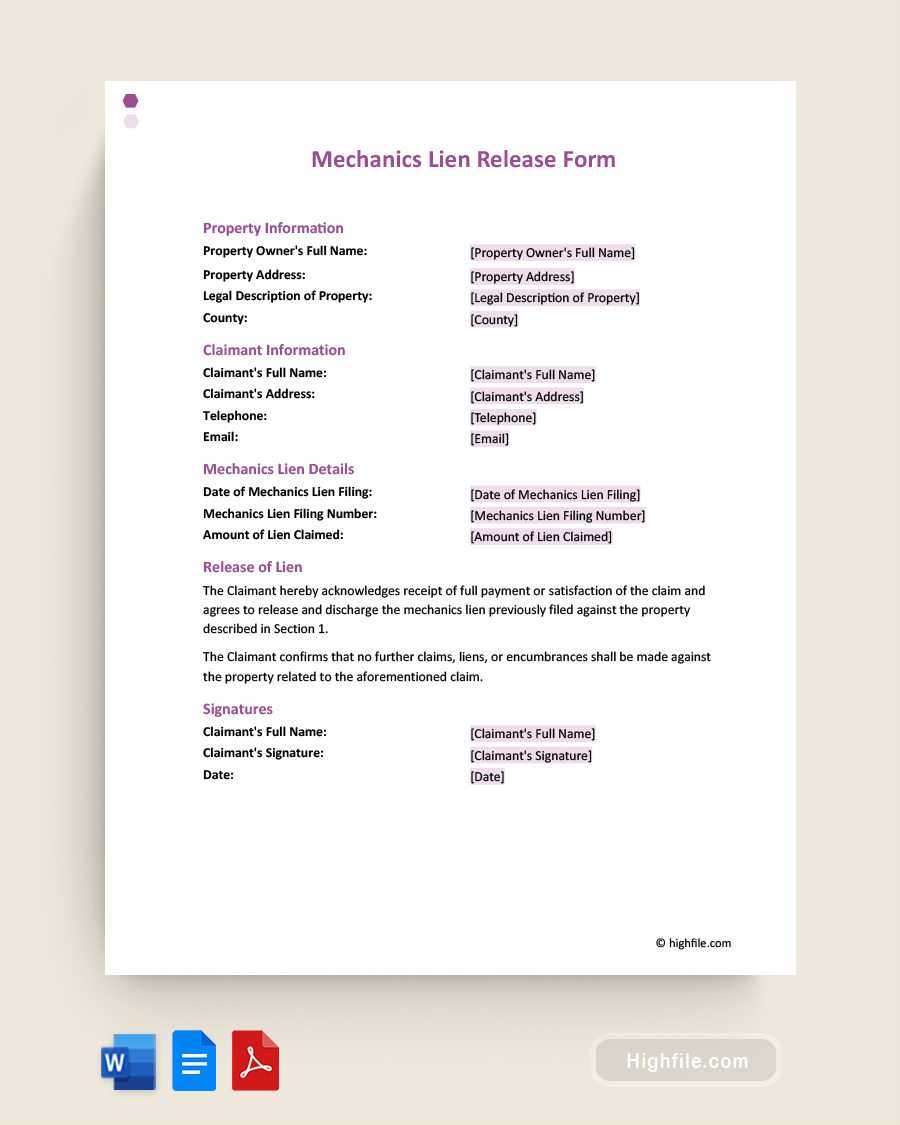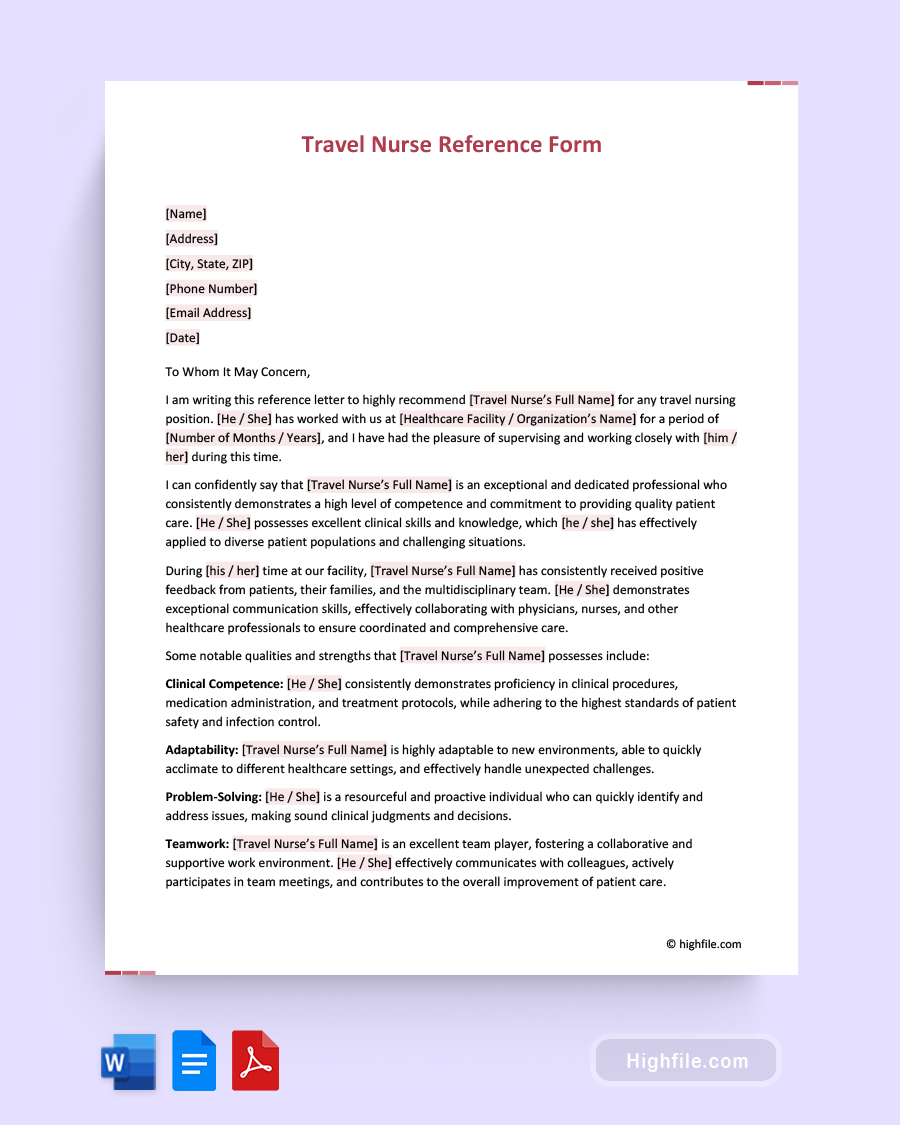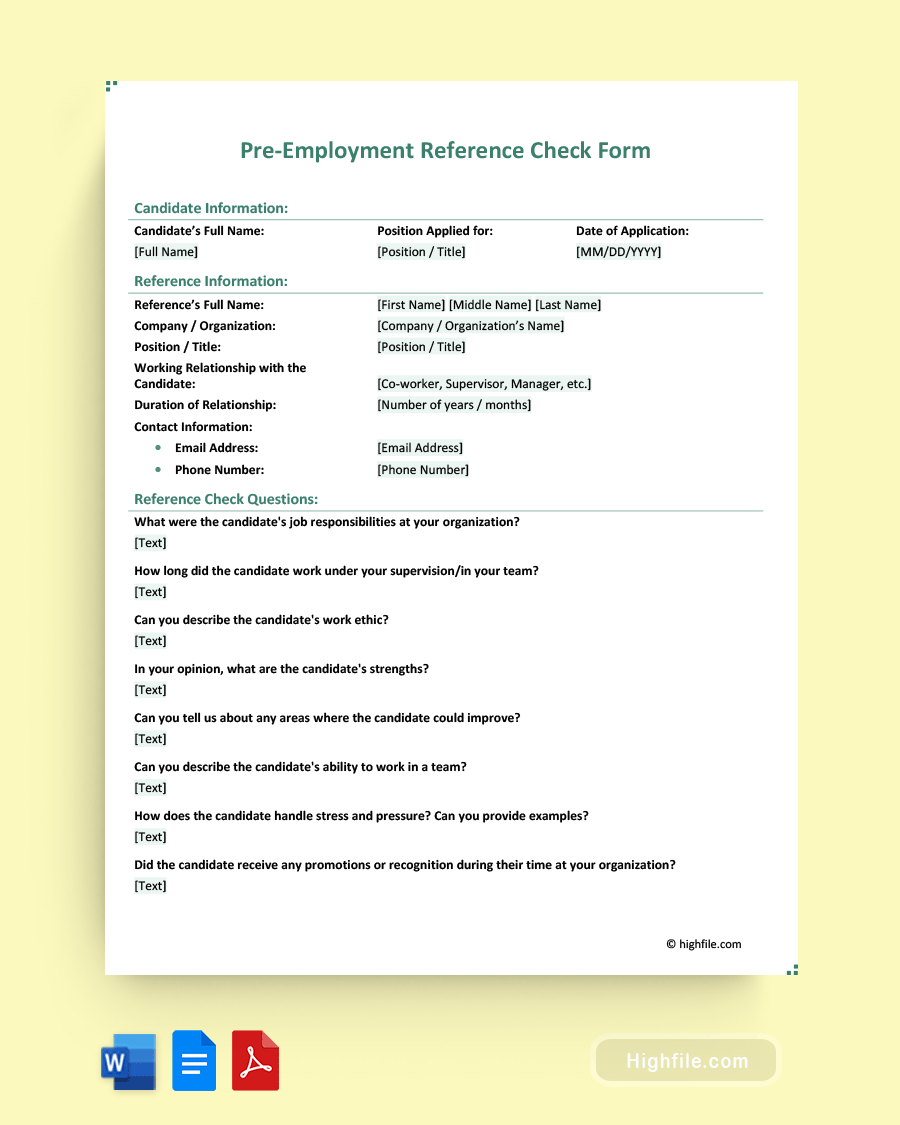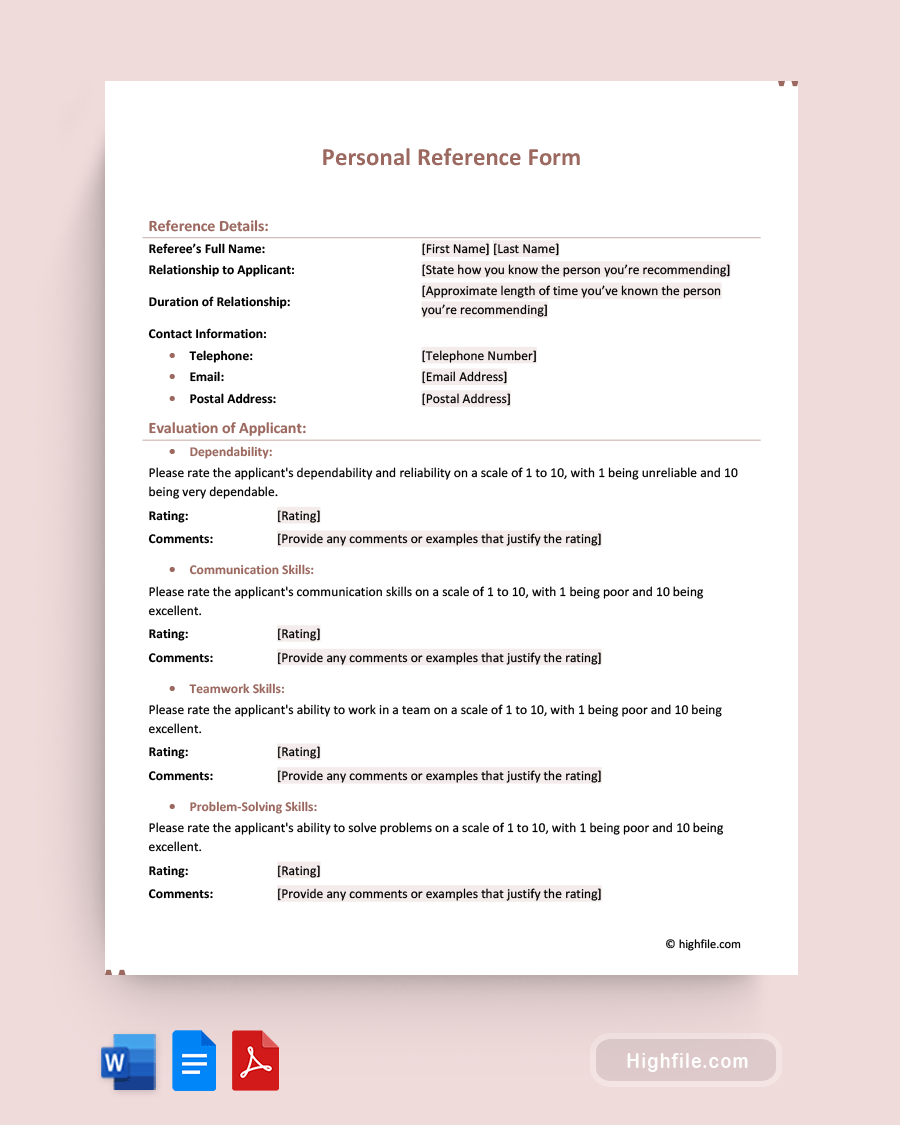Property rental shouldn’t be a difficult process, though it certainly can be. Landlords and tenants want to have a smooth and successful rental experience with no significant problems. Using a rental reference form helps everyone involved cut down on the risks involved in tenant selection. This document is a crucial resource for landlords to assess prospective tenants’ suitability while also allowing them to showcase their rental history and reliability. Our high-quality, professionally designed templates can help landlords streamline the process making the transition to a new tenant easier for everyone involved.
What Is a Rental Reference Form?
A rental reference form is used for renting a property. It collects information about a prospective tenant’s rental history from former landlords, property managers, and other reliable sources and helps landlords assess their suitability as a tenant. The form asks for details such as previous rental addresses, payment history, behavior, and other relevant information. Using these vital documents to ask for an outside reference is an excellent way to verify the accuracy of the tenant’s rental history, evaluate their financial reliability, assess their behavior as renters, and make informed decisions about renting the property to them.
Why Is Rental Reference Form Important?
The rental reference form is crucial in helping landlords make informed decisions about potential tenants. Here are several reasons why the rental reference form is important:
- Verification: It allows landlords to verify the information provided by the prospective tenant and ensures the accuracy of their rental history. It is a red flag if the tenant’s statements do not match those of the previous landlords or other referrers.
- Rental Payment History: It helps assess the tenant’s track record of paying rent on time, allowing landlords to gauge their financial reliability and time management skills concerning important bills.
- Behavioral Evaluation: It enables landlords to gain some insight into the tenant’s behavior. Before letting someone utilize an expensive investment like a rental property, it’s vital to understand whether they respected their previous property and maintained it well.
- Tenant-Landlord Relationship: The form lets previous landlords and property managers share their experiences and offer feedback on the tenant’s conduct and communication. While a landlord may not have had much personal experience with a good tenant, they often have plenty to say about unpleasant renters with whom they had to interact frequently.
- Eviction History: Landlords should use the rental reference form to inquire about previous evictions. Knowing if, when, and why a tenant was removed from a property outside of the standard completion of a lease is highly beneficial.
- Stability Assessment: This vital document helps landlords assess the tenant’s stability by considering the length of their previous tenancies. Not all rental agreements are meant to be long-term, and there are some cases, such as military families, where frequent moves are a practical, routine event. However, staying in one place shows reliability and financial maturity for most people.
- Character Evaluation: The reference form allows landlords to evaluate the tenant’s character and suitability for the rental property based on additional feedback from previous landlords.
- Tenant Selection: Landlords can use multiple references to compare and contrast prospective tenants and select the most suitable option.
Essential Elements of Rental Reference Form
The rental reference form can help landlords to obtain comprehensive details regarding the tenant’s background, rental history, and character references. By providing this information, tenants can demonstrate their reliability and trustworthiness as potential renters. However, the document is only valuable when appropriately formatted and collects comprehensive and helpful data. Here is a breakdown of the essential elements included in a rental reference form:
- Tenant’s Information: This collects the tenant’s personal details like their contact info, current address, and full legal name for communication and identification purposes.
- Reference Information: The next section gathers information about the reference’s connection to the tenant and the duration of their acquaintance. Knowing who the writer is and how long they rented to the applicant provides context for their feedback.
- Rental History: The rental history captures the tenant’s past rental experiences, including the address of the previous rental property, the duration of the rental agreement, and the monthly rent amount paid, enabling landlords to assess the tenant’s rental track record.
- Reference Questions: This section presents a set of professionally chosen inquiries for the writer to provide feedback and insights regarding behavior, reliability, and suitability as a renter.
- Additional Comments: Leaving space for other comments allows the reference to share any supplementary information or remarks about the tenant that may be relevant to the rental decision. However, it is crucial for the person giving the reference to adhere to local laws where disclosure is involved.
- Reference Name Signature and Date Lines: This simply provides a space for the reference to sign their name and indicate the completion date, ensuring the reference’s authenticity and accountability.
Note: Include a statement at the bottom of the form highlighting the purpose of the reference, emphasizing the confidentiality of the shared information, and granting authorization for the reference to disclose the requested details.
FAQs
A rental reference can be obtained from various relationships that a prospective tenant has had in the past. Here are some common relationships that qualify for a rental reference:
Former Landlords: Landlords from whom the tenant has previously rented properties.
Property Managers: These people represent companies responsible for managing rental properties.
Rental Agencies: Agencies that facilitate property rentals and handle tenant-landlord relationships can also be excellent references.
Roommates: Current or former roommates with whom the tenant has shared a rental property can be appropriate references, especially in college multi-room rental situations where the tenant did not choose a friend or acquaintance to live with.
Homeowners: Individuals renting a portion of their property to the tenant outside a traditional rental situation can have valuable insight, much like roommates.
Co-op Boards: In the case of cooperative housing, the board members who oversee the property are acceptable reference sources.
Employer or Supervisor: In certain situations, an employer or supervisor may provide a reference regarding the tenant’s character and reliability. However, these should be at the bottom of the list as they do not directly relate to renting.
Personal References: Other people who can vouch for the tenant’s personal qualities, such as responsibility and trustworthiness, should only be used as references when no other options are available.
Can I be held legally responsible for the information I provide on this form?
While laws can vary significantly depending on the jurisdiction, individuals who provide information on a rental reference form are generally protected as long as the information is accurate and not intentionally false or misleading. Landlords and property managers typically rely on the information to be provided in good faith. If it is discovered that the information provided was intentionally false or misleading, you can be held legally responsible for the information you provide. It is important to ensure the accuracy of the information you give on a rental reference form and avoid intentional misrepresentation.
Key Points
A rental reference form is a valuable document that facilitates informed decision-making and helps streamline the rental process. Landlords use these forms to gather crucial information about prospective tenants, allowing them to assess their rental history, payment reliability, and behavior as tenants. Tenants can and should provide references demonstrating their credibility and suitability as responsible renters. Whether you are a landlord seeking reliable tenants or a tenant looking to rent a desirable location, understanding the importance of rental reference forms can help you make the most of them and encourage positive tenant-landlord interactions in the future.
